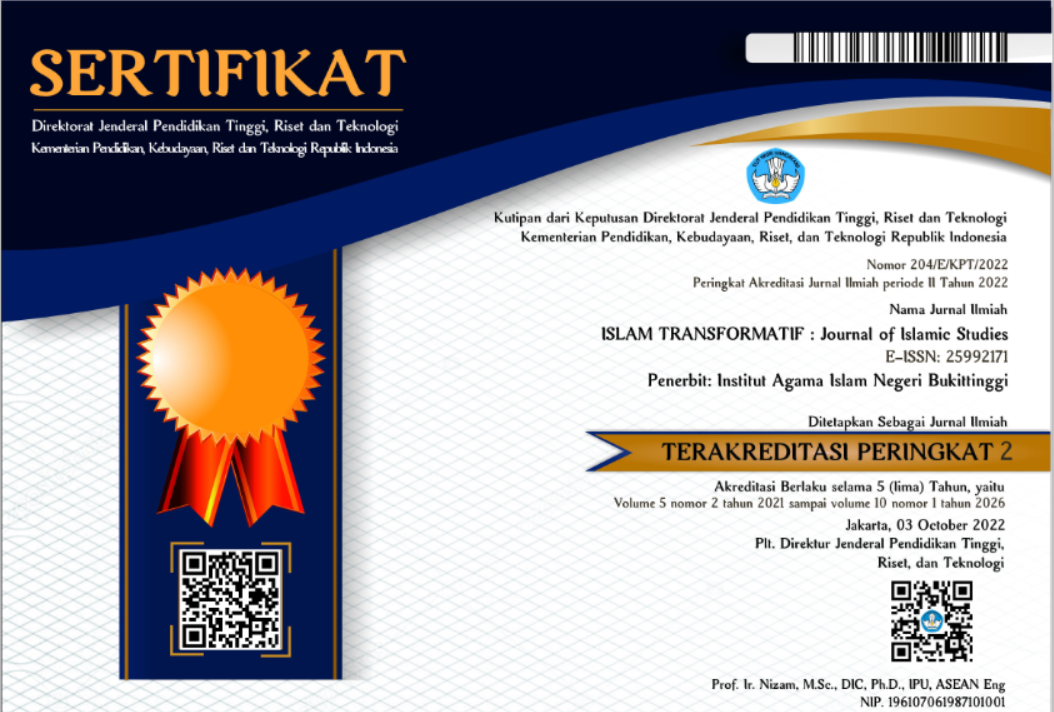WANITA TUNA SUSILA DI SUMATERA BARAT DAN PEMBINAANNYA (STUDI KASUS PANTI ANDAM DEWI SOLOK)
DOI:
https://doi.org/10.30983/it.v3i1.961Keywords:
Religious Coaching, Prostitute, House of Andam Dewi SolokAbstract
Tuna Susila (WTS) women are women who sell themselves and perform sexual acts as a livelihood, in terms of religion and health, the actions of Tuna Susila (WTS) women violate the norms in living life. In overcoming their efforts, there needs to be a guidance for Women Tuna Susila (WTS) to change their mindset so that they leave acts that are not following the prevailing norms in life. They can find better jobs and develop the knowledge that is in themselves as well as the knowledge that has been given while in the institution and return to the right path. The theory used in this study is the social theory of phenomenology (phenomenology Sociology), which was put forward by Alfred Schutz, who states that human action becomes a social relationship if humans give meaning or meaning to their activities as something meaningful. This study uses qualitative methods with descriptive types to develop the problems to be studied. From the results of the study, it was concluded that the coaching process that was obtained by Women Tuna Susil (WTS) while in the Andam Dewi Solok orphanage, had made most of the Tuna Susil Women (WTS) leave their jobs as Tuna Susil (WTS) and could continue their lives towards better. Forms of guidance given to Women with Tuna Susil (WTS) at Andam Dewi Solok orphanage can be grouped into four of them: (a). Physical guidance aims to improve the physical and health conditions of Tuna Susila Women (WTS) to be able to absorb the guidance material delivered. (b). Thoughtful guidance, the aim is to guide and improve the mental or psychological of the client. (c). Community social guidance aims to lead to harmony and community life togetherness. (d). Skills guidance, the purpose of this skill is for those who are trained to gain knowledge and skills so they can open their own business from the skills they have.
References
AD/ART Panti Andam Dewi Solok, 1980.
Alfurqan, Alfurqan, Rini Rahman, and Muhamad Rezi. “Pendidikan Orang Dewasa Yang Dikembangkan Rasulullah.†Islam Transformatif: Journal of Islamic Studies 1, no. 1 (August 7, 2017): 15–29. https://doi.org/10.30983/IT.V1I1.327.
Kartono, Kartini. Patologi Sosial. Bandung: CV Rajawali. 2011.
Laksana, Yuda Setia, Sholih Sholih, and Mochamad Naim. “Pelatihan Tata Rias Pengantin Bagi Wanita Tuna Susila Dalam Meningkatkan Kemandirian Usaha.†Journal of Nonformal Education and Community Empowerment 1, no. 1 (June 30, 2017): 43–54. https://doi.org/10.15294/pls.v1i1.14794.
Ramadhani, Widya Suci, Sri Sulastri, and Soni Akhmad Nurhaqim. “Proses Rehabilitasi Sosial Wanita Tuna Susila di Balai Rehabilitasi Sosial Karya Wanita (BRSKW) Palimanan Kabupaten Cirebon.†Prosiding Penelitian Dan Pengabdian Kepada Masyarakat 4, no. 2 (July 31, 2017). https://doi.org/10.24198/jppm.v4i2.14292.
Simandjuntak. Pengantar Kriminal dan Patologi Sosial. Bandung: Tarsito. 1977.
Downloads
Published
How to Cite
Issue
Section
Citation Check
License
Authors who publish with this journal agree to the following terms:
- Authors retain copyright and grant the journal right of first publication with the work simultaneously licensed under a Creative Commons Attribution-ShareAlike 4.0 International License that allows others to share the work with an acknowledgment of the work's authorship and initial publication in this journal.
- Authors are able to enter into separate, additional contractual arrangements for the non-exclusive distribution of the journal's published version of the work (e.g., post it to an institutional repository or publish it in a book), with an acknowledgment of its initial publication in this journal.
- Authors are permitted and encouraged to post their work online (e.g., in institutional repositories or on their website) prior to and during the submission process, as it can lead to productive exchanges, as well as earlier and greater citation of published work (See The Effect of Open Access).




